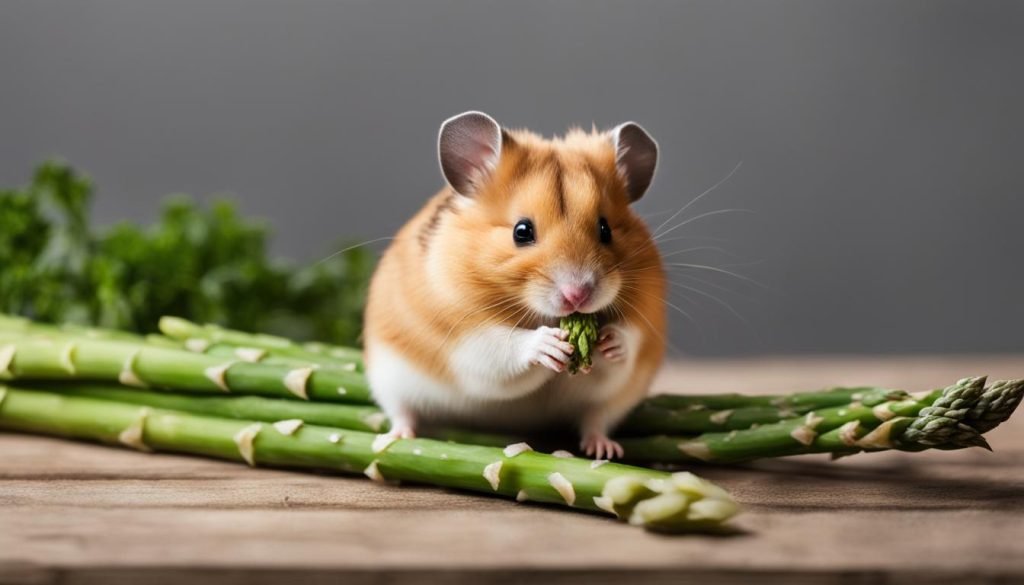Can Hamsters Eat Asparagus? Safe Feeding Guide
As a hamster owner, you want to ensure that your furry friend enjoys a balanced diet with a variety of safe and healthy foods. One vegetable that you may be wondering about is asparagus.
So, can hamsters eat asparagus?
The good news is that asparagus is safe for hamsters to eat and can be a nutritious addition to their diet. Asparagus is a low-calorie vegetable that is packed with fiber, vitamins, and minerals that are beneficial for your hamster’s overall health.
Asparagus is rich in vitamin C, iron, magnesium, and zinc. These nutrients can help support your hamster’s immune system and contribute to their overall well-being. Additionally, asparagus is high in antioxidants, which can help reduce stress and promote a healthy immune response in hamsters.
When feeding asparagus to your hamster, it is essential to do so in moderation. Too much asparagus can cause gastrointestinal distress such as diarrhea or stomach discomfort. The amount of asparagus to feed will depend on the size and type of your hamster. Larger hamsters can be given a small piece of asparagus daily, while dwarf hamsters should be given asparagus 2-3 times per week.
It is important to note that you should only feed fresh asparagus to your hamster. Canned, jarred, or frozen varieties may contain high levels of sodium and preservatives that could be harmful to your hamster’s health. It is also recommended to wash the asparagus thoroughly before serving it to remove any pesticides or dirt.
When preparing asparagus, you can cook it through methods such as steaming, blanching, or microwaving to retain its nutritional value. Avoid long cooking times or roasting, as they may reduce the beneficial nutrients in asparagus.
So, to summarize, asparagus can be a safe and healthy addition to your hamster’s diet. When fed in moderation, asparagus can provide your hamster with essential vitamins, minerals, and fiber. Remember to choose fresh asparagus, wash it thoroughly, and prepare it using suitable cooking methods. By following these guidelines, you can offer your hamster a nutritious and enjoyable snack.
Key Takeaways:
- Asparagus is safe for hamsters to eat and can contribute to a balanced diet.
- Feed asparagus in moderation to prevent gastrointestinal distress.
- Choose fresh asparagus and avoid canned or frozen varieties.
- Wash asparagus thoroughly before serving it to your hamster.
- Use suitable cooking methods to retain the nutritional value of asparagus.
Can Hamsters Eat Asparagus? Is it Safe?
As a hamster owner, you may wonder if it is safe to feed asparagus to your furry friend. Good news! Asparagus is indeed safe for hamsters to eat and can even provide some health benefits. This low-calorie, high-fiber vegetable is packed with essential vitamins and minerals that support your hamster’s overall well-being.
One of the key advantages of asparagus is its antioxidant content. Antioxidants play a vital role in helping the hamster’s body metabolize free radicals and boost its immune system. By incorporating asparagus into your hamster’s diet in moderation, you can help improve its immunity and overall health.
Feeding asparagus to your hamster does not pose any significant risks or toxicity. However, it’s important to avoid overfeeding. Overconsumption of asparagus may lead to temporary gastrointestinal distress, such as diarrhea, gas, and stomach discomfort. Keep a close eye on your hamster’s response to asparagus and adjust the feeding amount accordingly. If any unusual symptoms persist or worsen, it is advisable to consult a veterinarian.
Remember, moderation is key when introducing new foods to your hamster’s diet. By providing a balanced and varied diet, including safe vegetables like asparagus, you can ensure your hamster enjoys a nutritious and healthy lifestyle.
How to Feed Asparagus to Hamsters?

Feeding asparagus to hamsters can be done in both raw and cooked forms. However, there are a few important steps to follow to ensure the asparagus is safe and suitable for your furry friend.
1. Thoroughly wash the asparagus: Before serving asparagus to hamsters, it is crucial to clean the vegetables thoroughly to remove any harmful pesticides or chemicals. This can be done by rinsing the asparagus under cold water.
2. Use appropriate cooking methods: Cooking methods such as steaming, blanching, or microwaving can be used to prepare asparagus for hamsters. These methods help retain the nutritional value of the vegetable while ensuring it is safe for hamsters to consume. It is important to avoid roasting, baking, or using long cooking times, as they may reduce the nutritional content of the asparagus.
3. Allow the asparagus to cool: After cooking the asparagus, it is essential to let it cool completely before feeding it to your hamster. This helps prevent any potential injuries or burns that could occur if the asparagus is too hot.
4. Consider size and quantity: The size of the asparagus piece should be small enough for the hamster to hold comfortably, approximately paw-sized or slightly larger. Feeding large chunks of asparagus may be difficult for hamsters to manage. Additionally, it is important to feed asparagus in moderation, incorporating it into their diet as a treat or occasional addition.
Observing your hamster’s preference for raw or cooked asparagus can help tailor the feeding method to their liking. Some hamsters may prefer the texture and taste of raw asparagus, while others may enjoy the softer cooked version. It’s a good idea to experiment and see which option your hamster enjoys more.
Remember, a varied diet is essential for a hamster’s overall health and well-being. While asparagus can be a nutritious addition to their diet, it is important to introduce other safe and healthy vegetables as well. Consulting with a veterinarian can provide further guidance on hamster-friendly vegetable options and specific feeding guidelines for your furry friend.
Other Vegetables for Hamster Diet
In addition to asparagus, other safe and healthy vegetables can be included in a hamster’s diet. Adding variety to your hamster’s food can provide them with a balanced and nutritious diet. Here are some recommended vegetables that are safe and beneficial for hamsters:
- Romaine lettuce
- Dandelion greens
- Broccoli
- Spinach
- Other dark green vegetables
These vegetables offer a diverse range of vitamins and minerals that contribute to your hamster’s overall well-being. Remember to introduce new vegetables slowly, in small portions, to prevent any stomach upset. It’s always important to consult with a veterinarian to get specific recommendations tailored to your hamster’s dietary needs.
Final Thoughts
In conclusion, asparagus is a safe and healthy vegetable that can be a valuable addition to a hamster’s diet. It provides essential nutrients such as vitamins, minerals, fiber, and antioxidants, which contribute to the overall well-being of the hamster. However, it is crucial to feed asparagus in moderation and observe the hamster’s response to prevent any potential gastrointestinal issues. Consulting with a veterinarian is always recommended to ensure the hamster’s specific dietary requirements are met.
Furthermore, offering a variety of safe and healthy vegetables alongside asparagus can provide the hamster with a balanced nutritional intake. Vegetables like romaine lettuce, dandelion greens, broccoli, and spinach are excellent choices to add diversity to the hamster’s diet. Introducing new vegetables gradually and in small portions can help prevent any digestive disturbances.
It is important to prioritize the hamster’s well-being by providing fresh, high-quality vegetables and seeking professional guidance when needed. By offering a range of nutritious foods, you can ensure that your hamster enjoys a healthy and fulfilling diet.
Similar Posts
- Can Hamsters Eat Peaches? Safe Snacking Tips
- Can Hamsters Eat Cilantro? Safe Herb Guide
- Can Hamsters Eat Cantaloupe? Find Out
- Can Hamsters Eat Avocado? Diet Safety Tips
- Can Hamsters Eat Pineapple? Safe Snack Guide
- Can Hamsters Eat Green Beans? A Complete Guide
- Can Hamsters Eat Blackberries? Safe Treat Tips
- Can Hamsters Eat Popcorn? Safe Snack Tips
- Can Hamsters Eat Salami? Here’s Why Vets Say No







